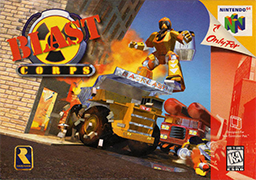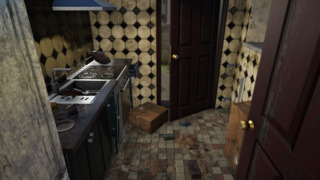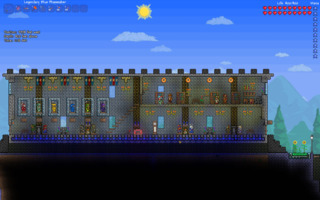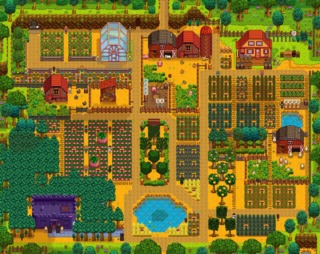Build Me Up: Creation Games
By Mento 0 Comments
As the video game industry continues to grow, it is thus required to seek out avenues of growth. You can't appeal to the same audience with the same whiz-bang action fare forever, and that's keenly understood by the indie market most of all who have been pitching to audiences from all walks of life (largely because indie developers themselves come from all walks of life also). Even before this boom of alternative genres and perspectives, the video game industry has frequently toyed with ideas other than blowing shit up, including that concept's exact antithesis: creating shit, possibly for others to blow up at a later date.
A little while back, I went into adventure games and how they were an eclectic and wide-reaching genre even before the indie golden age expanded the variety of subgenres available at least twofold. This time, I want to look at game genres that run counter to the usual pillars of destruction and mayhem that the biggest games are predicated on and instead look towards those that encourage creative pursuits and constructive efforts. Instead of listing a bunch of games/genres, however, I'm going to take the stages of construction from a single game - Dragon Quest Builders, a Dragon Quest spin-off in the Minecraft mold - and use those as launching points to discuss other games that cover those stages more exclusively, or at least in greater detail. There's a lot that can go into making something from nothing, it turns out.
Demolition

The first stage of any construction job is, paradoxically, the act of destroying whatever it is taking up the space you need. A number of creative-oriented games usually just give you a blank canvas to work with from the outset, forgoing the act of clearing out or eliminating undesirable terrain or objects that might presently take up the spot. Others recognize that available space is finite, and that the ruins of old must be torn down for something new and useful (though maybe hang onto the Parthenon and the Pyramids; I'm not that much of an iconoclast).
In Dragon Quest Builders, our common denominator case study, any defined settlement area contains remnants of the towns that once stood there. You can build around those remnants, or you can knock them down for the resources and start planning your settlement from scratch. Likewise, most construction-based games require that you gather material resources by destroying the nearby natural landscape. It's a prime opportunity to make some sweeping statements about the dangers that human expansion can have on the local ecosystem: it doesn't seem to bother DQB too much, since resources are plentiful, but there can come a time when you need to dig up and replant a few curative bushes for a garden which have become thin on the ground because you've been instinctively hacking them down for their medicinal leaves whenever you pass one by.
My external example for this category would be something like Satisfactory. Though you spend much of that game constructing a working mass-production facility, you're given larger and larger structures to build in order to keep up with your primary goal of shipping material goods off-planet. Some of these, like the space elevator, take up so much real estate that you can't help but raze the forests and grasslands of the picturesque alien planets you land on for the sake of some featureless level ground upon which to safely plant the foundations for these buildings. You're also mining every resource node you come across, and moving further and further afield for material wealth to exploit, making Satisfactory the sort of game where the end goal is turning a veritable Eden into a cold, grey inorganic kraken of conveyor belts and assembly lines.
Construction

Construction immediately follows demolition, laying the groundwork for the buildings and establishments to come. Depending on the game, the construction is either expedited - you simply drop a whole building or room on top of your existing design - or it's a major aspect of the gameplay. I tend to think of "gamified" construction as being like a game of Jenga or Boom Blox: figuring out the best way to build a structure upwards without letting gravity or weak links in the chain bring the whole structure crashing down.
In Dragon Quest Builders, the world is made out of cubes - the archetypal Minecraft building blocks - which makes construction planning an easy case of determining how many cubes long, wide, and tall you want your rooms to be. DQB simplifies things a little by never insisting on roofs - being in enclosed spaces messes with the top-down camera, so they usually drop the matter and assume everyone's OK with being rained on occasionally - and a building only needs to be two blocks high to register as an enclosed building rather than some open-air pavilion. A case where the rules don't make a whole lot of sense from a technical perspective, but sensible enough when accounting for the game's mechanical shortcomings. At either rate, it's a cinch to drop a two-block high wall of earth around any space you want to carve out for a specific purpose.
My pick for a pure construction experience would be any of those bridge-builders so beloved by the handyperson/Vinny Caravellas of the world, such as Poly Bridge. The construction is the entire point to these games: you not only have to consider the form of the bridge but the various technical and physics-based properties of same. It needs to stand up long enough to perform its job, while overall still staying under budget, forcing the player to create the most stable engineering they can with limited resources. I'd also like to honorably mention here other engineering-inclined games like Besiege and Banjo-Kazooie: Nuts & Bolts. Can't also forget the Super Mario Maker series: possibly the most popular building games out there right now.
Renovation

An alternative to the demolition/construction cycle, renovation (or restoration) has you taking a beaten down, "fixer-upper" site and transforming it back into a liveable space (or a space suitable for whatever you mean to use it for) rather than tearing the entire thing down and starting over. Repairing gaps in the foundation, patching up walls, replacing fixtures like windows and doors, or giving the place the once-over with a vacuum or duster: activities like these often feel more like work than other gameplay variants in the wider creation genre, but a savvy enough game in this mold can vary up the tasks sufficiently that you're unlikely to get bored before you're done. I particularly like games that focus on renovation as it allows you to retain the original appeal of these locations, eventually restoring them to their former glory.
With Dragon Quest Builders, the above example of taking the town location and levelling it to build anew would instead have you trying to restore the town to how it may have appeared by working backwards from the size and shape of the rubble left behind. You can get a feel for how a town used to look like based on the type of materials it's built out of: some places still have a few errant cubes of colored flagstone or brickwork that indicates what the whole building was once made from, and with a little extra effort you can figure out a way to clad your new town of dirt mounds to resemble the colorful cities of old. Stronger building materials like brick and flagstone also improve the endurance of your buildings when enemies come by to cause damage, as well as the settlement's aesthetic appeal which the game also tracks and rewards.
I think a suitable external example for a game where renovation is the focus would be something like House Flipper. The budget house restoration sim finds its zen stride in giving players a list of demands to work through in order turn a dilapidated shanty into a domicile anyone might feasibly want to reside in, starting with cleaning work and leading up to the replacement of furniture and appliances. I also want to give a shout out to Viscera Cleanup Detail, on which I spent hours of peaceful busywork to clean up the gore and scorch marks from a battle I was fortunate (or perhaps unfortunate) to have missed. It's such a slog of a game, not made any better by the way the capricious physics of your bucket and trash bins will create even bigger messes if handled improperly, but there's something rewarding about sitting back and admiring your work turning a Doom level back into the spotless research station it was before. At least until you realised you could've applied the same energy to your own home, or to someone else's for an actual paycheck.
Beautification

I'm not entirely sure it's a valid word, but beautification is taking something functionally basic and improving its aesthetic appeal with furnishings and new paint colors. Like interior decorating, but encompasses the external too. ("Decoration" might've been a better term for this, but too late to change it now we're on the clock here.) This is usually an optional process in games that allow you to create/find/purchase cosmetic objects purely for making your homestead look nicer, but there's the occasional game in which it plays a more pivotal role over more architectural concerns.
In Dragon Quest Builders, you are given the occasional quest objective to "level up" the town. This is done by creating more rooms that fulfil specific purposes, upgrading the materials that the walls and floors are built from, and sprucing the place up with any number of cosmetic items that serve no other purpose than to make the town a better looking place and raise this quality score. Fortunately, you can get a decent stack of these cosmetic items in the main campaign by stripping dungeons and castles and other hostile locations of their more extravagant furnishings. Sconces and other fancy light fixtures seem to be the most common, though you also get curious items from enemy drops too. If all else fails, you can see what you can build cheap and easy and just place dozens of them around town. It's not like the game has the artistic wherewithal of determining the aesthetic appeal of a room packed wall-to-wall with repurposed treasure chests and dragon skeletons.
Animal Crossing: Happy Home Designer is one of the few games I can think of where some effort was made to create a game engine capable of ascertaining the visual drama of your interior decoration projects, though from most accounts you could still fill each client's house with trash and get away with a passing grade. The Style Savvy series does something similar, but for people instead of houses so that's probably disqualified. I think for now this is limited to peer-to-peer assessment: people all across the Minecraft and Terraria and Dragon Quest Builder subreddits have built elaborate homes and cities with strong visual themes and uploaded screenshots for others to appreciate, and for now that might be as accurate as we get for a video game version of The Great Interior Design Challenge.
Cultivation

In addition to improving the look of the urban aspects of your town planning, there's also the frequently underappreciated element of creating and maintaining gardens and other botanical features. SimCity introduced parks early on for their importance for combating pollution and improving the residents' happiness, and most home or town builders usually give you a plot of land to transform into something attractive with flowers and other foliage or something productive like a vegetable patch or fruit tree orchard.
Cultivation doesn't really become a factor in Dragon Quest Builders until the second campaign, in the venomous lands of Rimuldar. The town once sat next to a pristine lake, now corrupted by the venom produced by the nearby monsters, and your goal is to heal people you find across the barren wastes outside of the town by carrying them back to the field clinic you've built. Some requests for healing require you to grow your own healthy crops as a case of "feeding a cold to starve a fever" - the game then teaches you how to create a garden, transplanting plants found in the wilderness by way of a shovel, and letting these crops grow to full fruition to provide much greater yields than their wild equivalents.
There's a few obvious farming examples here, between Farming Simulator [Year] or Harvest Moon or Stardew Valley, but I'm going to invoke a more obscure game in my back catalog here just to be precious: Chibi-Robo: Park Patrol. In this DS sequel to the adorable house-cleaning adventure game for GameCube, the goal is to take a large plot of parkland and transform it by completing various tasks on each tile "square" of the park's layout. This is done by tilling the soil, planting and watering flowers, installing features like fountains and park benches, and following the requests of the local residents both human and otherwise. It's a slightly less successful effort of following up the domestic escapades of the original, but it worked as a portable game you could put a little work into every so often.
Civilization

So, as was the case in the first half of Terranigma, once you've restored the land and the flora and fauna, all that's left is to focus on that most fickle of creatures: humanity. Civilization is how construction games build communities and societies by allowing the player to invite NPCs to dwell in the creations they've built, and attend to whatever needs they have in order to keep them around. The last stage of most town-building games (though occasionally the first and only), one could argue that meeting the needs of the populace is the entire point of building the town in the first place. Frankly, I'm happy to just look at all the wonderful, spotless edifices I've built as they remain pure and immaculate for all time without some grubby bipedal apes wiping their dirty hands all over it. (What? Oh right, my therapist said I should probably stop referring to people that way. My parole officer too, come to think of it.)
In Dragon Quest Builders, the NPCs are the crux of the game's progression in the story mode: NPCs have quests for you to perform, or announce the arrival of a new wave of enemies to thwart before they trash your town, and completing all their fetch quests and construction challenges moves each campaign forward to its finale. I don't know how many humans there are in the game's "free build" mode, Terra Incognita, but I imagine they won't constantly demand you do things. NPCs will also pull their weight too: building creation stations like an alchemy bench or a cookfire will let them create items for you over time, and many of them will also take part in the fighting to protect their towns. Though you may have to work harder to create somewhere for them all to sleep, the dividends of a more populous town become quickly apparent.
Ironically, I probably wouldn't use the game Civilization to define what I mean by the above. Instead, it'd be something like The Sims where the architectural aspect of the game is incidental to keeping your society of nonsense-spewing homunculi happy, healthy, and relatively free of pants-peeing incidents. I could also invoke games where you build homes to the specifications of your clientele, such as the above Animal Crossing: Happy Home Designer example, or the very specific town planning management of Dark Cloud 2's Georama sequences - the goal of which is to recreate almost exactly what the town looked like prior to its sudden vanishing act based on the half-remembered benchmarks of the people who live there.
Collaboration

Finally, collaboration refers to how many games of this type are multiplayer experiences at heart: creating an entire house or town from scratch becomes easier when there are many hands at the wheel. These tend to be the subject of many a co-operative game, as the implicit goal is to create a singular accomplishment between all of your efforts. In some development games, cooperation with the local populace is a major factor, and your decrees to build a new marketplace or granary in a settlement is often contingent on how many happy and willing workers you have to rely on.
Dragon Quest Builders is, as far as I know, purely a single-player experience.
However, the games it draws from like Minecraft and Terraria are built to be played cooperatively with other players online. To revisit a packed Terraria server after breaking the first ground a few hours previously can often produce a remarkable disparity from the rudimentary mudhuts that existed before to whatever elaborate metropolises you return to, within reason at least. I remember when Rorie set up a Giant Bomb Terraria server for the sake of some UPF segment, and was amazed at all the minecart tunnels and skyscraper superstructures our busy community had been working on when it came time to sign back in for the live stream. I'm always a little cagey and selfish when it comes to sharing video game worlds with others - I don't play MMOs and I rarely touch multiplayer in general - but there's something to be said for being part of a much larger whole.
Talking of large holes, it's probably time I get off my own and start doing some housework around here. Thanks for stopping by, and I fully intend to keep building (as it were) a more exhaustive list of games where construction and handiwork are key. I'm not necessarily against the idea of shooting aliens and Nazis in the face with plasma rifles, just that I appreciate jumping around the vast spectrum of games out there and the experiences they are capable of recreating. I've been eyeing more Stardew-esque games passing through the release schedules lately, like My Time in Portia or Yonder: The Cloud Catcher Chronicles or Forager, and I feel like I'm going to break down and get one the next time I feel like being productive (but not so productive to stop playing video games...).
